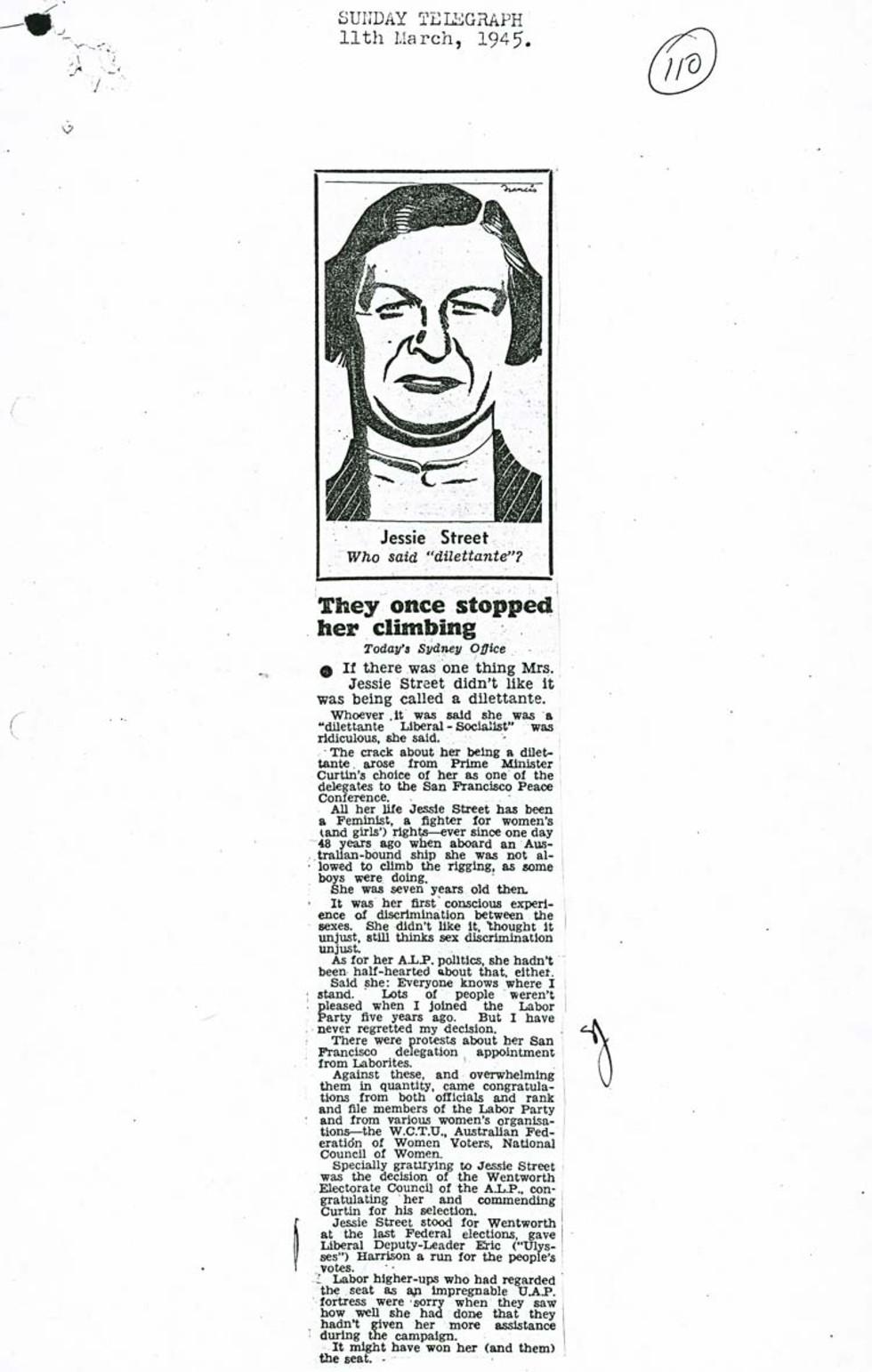


Transcript
[Typed annotation]
SUNDAY TELEGRAPH
11th March, 1945.
[Drawing of Jessie Street]
[Caption of drawing]
Jessie Street
Who said "dilettante"?
[Text of article]
They once stopped her climbing
Today's Sydney Office
If there was one thing Mrs. Jessie Street didn't like it was being called a dilettante.
Whoever it was said she was a "dilettante Liberal – Socialist" was ridiculous, she said.
The crack about her being a dilettante arose from Prime Minister Curtin's choice of her as one of the delegates to the San Francisco Peace Conference.
All her life Jessie Street has been a Feminist, a fighter for women's (and girls') rights—ever since one day 48 years ago when aboard an Australian-bound ship she was not allowed to climb the rigging, as some boys were doing.
She was seven years old then.
It was her first conscious experience of discrimination between the sexes. She didn't like it, thought it unjust, still thinks sex discrimination unjust.
As for her A.L.P [Australian Labor Party]. politics, she hadn't been half-hearted about that, either.
Said she: Everyone knows where I stand. Lots of people weren't pleased when I joined the Labor Party five years ago. But I have never regretted my decision.
There were protests about her San Francisco delegation appointment from Laborites.
Against these, and overwhelming them in quantity, came congratulations from both officials and rank and file members of the Labor Party and from various women's organisations—the W.C.T.U. [Woman's Christian Temperance Union], Australian Federation of Women Voters, National Council of Women.
Specially gratifying to Jessie Street was the decision of the Wentworth Electorate Council of the A.L.P., congratulating her and commending Curtin for his selection.
Jessie Street stood for Wentworth at the last Federal elections, gave Liberal Deputy-Leader Eric ("Ulysses") Harrison a run for the people's votes.
Labor higher-ups who had regarded the seat as an impregnable U.A.P. [United Australia Party] fortress were sorry when they saw how well she had done that they hadn't given her more assistance during the campaign.
It might have won her (and them) the seat.
About this record
This newspaper article, published in The Daily Telegraph on 11 March 1945, reports the appointment of feminist Jessie Street as a delegate to the San Francisco Peace Conference in 1945 by then Prime Minister John Curtin. At the top of the news report is a black-and-white cartoon of Street with the caption 'Jessie Street / Who said "dilettante"?' The headline reads 'They once stopped her climbing'. The article begins with Street's dismissal of the label 'dilettante', mentions her appointment, describes her as a fighter for women's rights, and discusses her electoral candidacy for the Australian Labor Party.
Educational value
- Australian feminist Jessie Mary Grey Street (1889–1970), whose appointment to the San Francisco Peace Conference in 1945 is reported here, made a significant contribution to the conference’s work on the United Nations. Street lobbied for equal rights for women to be recognised in the United Nations Charter, for the establishment of the Commission on the Status of Women (of which she was then vice-president from 1947 to 1948) and for the establishment of the Human Rights Commission.
- Jessie Street was one of the most important Australian feminists of the 20th century. She campaigned throughout her life for women to be paid equal wages to men, against the practice of dismissing women workers when they married, and against the exclusion of women from certain types of work. She also set up programs to assist women with contraception and reproductive health and was president of the United Women's Association from 1930 to 1950.
- The newspaper article highlights Street's treatment by the Australian Labor Party. It points out that she had performed unexpectedly well in the 1943 election as a Labor candidate for the House of Representatives seat of Wentworth, which the Labor Party regarded as unwinnable. Street was endorsed for this seat after being refused endorsement for the more winnable seat of Eden–Monaro. She had joined the Labor Party in 1939, hoping to further the cause of reform on behalf of women.
- Along with the other women at the Peace Conference to which this article refers, Street succeeded in having the word 'sex' included in the clause 'without distinction as to race, sex, language or religion' wherever the clause occurs in the United Nations Charter. She also worked for the inclusion of Article 8, which acknowledges the eligibility of 'men and women' to participate 'in any capacity and under conditions of equality' in the principal and subsidiary organs of the United Nations.
- Street's long relationship with international movements would have been a factor in her appointment to the Peace Conference. She and her husband were founding members of the League of Nations Union. As president of the United Women's Association she had joined with the British Commonwealth League to lobby the International Labour Organization for women's rights in the 1930s.
Acknowledgments
Reproduced with permission from The Daily Telegraph.
Related themes
Need help with your research?
Learn how to interpret primary sources, use our collection and more.



